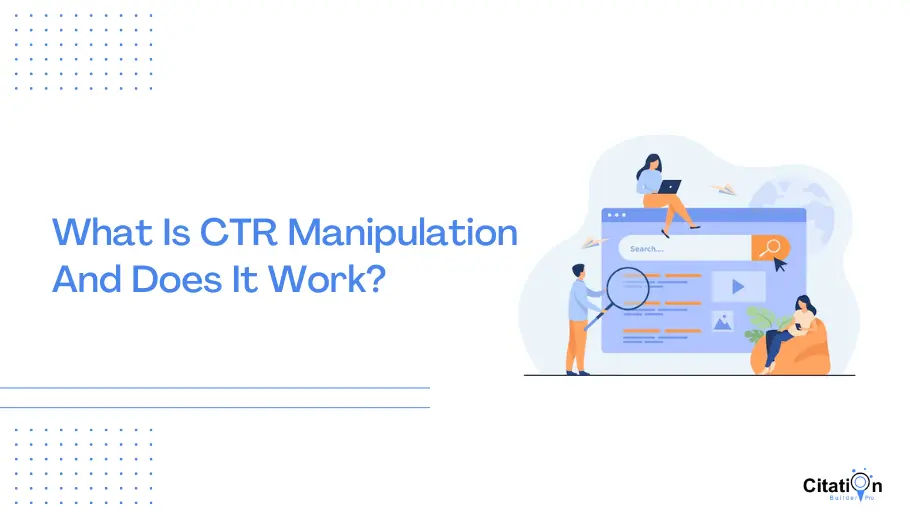LinkDaddy CTR Manipulation: Specialized Services for Improved Internet Traffic
LinkDaddy CTR Manipulation: Specialized Services for Improved Internet Traffic
Blog Article
Checking Out the Connection In Between CTR Adjustment Providers and User Habits
In the realm of digital marketing, the influence of click-through price (CTR) control solutions on user habits remains a complicated and interesting topic. By dissecting the complex connection between CTR adjustment services and user behavior, intriguing insights emerge that might reshape our understanding of electronic advertising approaches and their results on consumers.
Effect of CTR Control on Behavior
Assessing the impact of Click-Through Price (CTR) control on user actions exposes critical understandings right into the dynamics of online interaction. CTR control entails artificially blowing up the variety of click a certain link or promotion to trick customers and online search engine. This method can bring about a distorted understanding of a website's appeal or relevance, eventually affecting individual behavior.

Additionally, CTR control can alter the data utilized by formulas to customize user experiences. This can result in individuals being offered web content that does not straighten with their preferences or rate of interests, ultimately leading to a decline in customer satisfaction and engagement. Understanding the impact of CTR adjustment on customer actions is crucial for maintaining openness and trust fund in on-line interactions.
Customer Interaction With Manipulated CTR
Customer involvement with controlled CTR information commonly causes manipulated assumptions of on-line material popularity and relevance. When customers engage with content based on unnaturally inflated Click-Through Fees (CTR), they may think that specific information, items, or services are more popular or reliable than they in fact are. This can lead to users choosing based upon deceptive data, leading to potentially unfavorable end results.
Interaction metrics like sort, shares, remarks, and time spent on a webpage are frequently affected by CTR control. Users may be a lot more inclined to engage with web content that shows up to have greater interaction prices, even more perpetuating the cycle of skewed assumptions. As an outcome, material creators and advertisers might prioritize generating material that produces high CTR instead of concentrating on developing really useful and appropriate material.

Psychological Results of CTR Adjustment

Furthermore, the mental effects of CTR adjustment can additionally materialize in transformed decision-making processes. Users may be more inclined to click content solely based on its regarded appeal, as opposed to its actual value or relevance to their demands. This behavior change can lead to a surface engagement with on-line material, where individuals might forget premium but much less preferred offerings for those find out with unnaturally boosted CTRs.
Fundamentally, the mental implications of CTR adjustment highlight the value of keeping transparency and credibility in on-line interactions to foster authentic user interaction and depend on.
Honest Factors To Consider in CTR Manipulation
Considering the honest effects of adjusting click-through prices (CTR) in on-line systems is imperative for preserving integrity and trust within the electronic ecological community. CTR manipulation increases issues regarding tricking customers, distorting information analytics, and compromising the credibility of on the internet content. One major moral consideration is the potential effect on individual freedom and decision-making. By artificially blowing up CTR, customers may be misinformed into clicking links or ads they would not have selected otherwise, leading to a disingenuous online experience. CTR adjustment can skew the performance metrics that businesses depend on to make strategic choices, inevitably influencing market competitors and consumer trust.
An additional moral facet to consider is the justness of adjusting CTR to obtain an unreasonable benefit over competitors. Involving in such practices not just goes against concepts of justice yet likewise weakens the trust fund that individuals put in online platforms. It is necessary for businesses and electronic marketers to support honest criteria in their methods to guarantee transparency, trustworthiness, and lasting sustainability in the online environment.
Effects for Digital Advertising And Marketing
With the raising dependence on electronic systems for advertising and marketing objectives, the technique of adjusting click-through prices (CTR) positions considerable implications for the efficiency and stability of electronic advertising and marketing methods. CTR manipulation can why not check here result in skewed information analytics, misguiding online marketers right into believing that their campaigns are doing far better than they really are. This can lead to misallocation of resources, with companies purchasing underperforming techniques based upon falsified CTRs. When individuals recognize that CTRs have actually been manipulated, it can deteriorate depend on in the brand name, leading to long-term unfavorable effects for customer loyalty and brand name track record.
Furthermore, the use of CTR manipulation solutions can create an unjust competitive landscape, where firms that take part in such practices get a synthetic advantage over those that abide by moral advertising criteria. This can suppress technology and creative thinking in electronic marketing, as success ends up being even more about adjustment tactics than delivering authentic value to consumers. Eventually, the effects of CTR adjustment for electronic marketing prolong beyond temporary gains, impacting the overall sustainability and integrity of advertising efforts in the electronic realm.
Conclusion
Finally, the partnership in between CTR manipulation services and user habits is complicated and multifaceted. The impact of CTR control on behavior, user involvement with controlled CTR, mental results, honest considerations, and ramifications for electronic advertising and marketing all contribute fit this relationship. Comprehending these dynamics is vital for marketers and researchers alike in order to navigate the moral ramifications and make best use of the performance of their digital advertising strategies.
Report this page